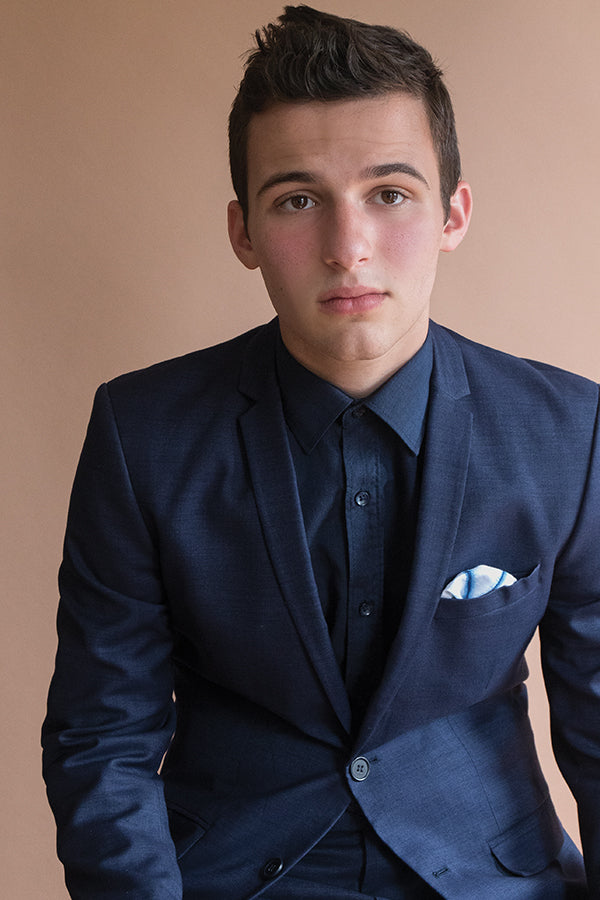Marching On
It’s almost noon in New York City. Cameron Kasky, 18, comes in, wearing a Columbia University sweatshirt that he bought the previous day. He has a lot on his mind, detailing every single item – the college hoodie was a bit expensive for him, he would return to Florida very soon but then would come back here in 2 weeks, he loves old-school music (as opposed to trendy pop music we were just listening to while waiting for his arrival), and on top of that, he would have to see if he could make his 3 p.m. Viacom meeting after our shoot. It’s a sunny day in early July.
 On February 15, 2018, Kasky, along with fellow Marjory Stoneman Douglas High School students, worked toward impacting the conversation surrounding their school’s recent shooting. This was far from being the first of its kind, and the events that would follow were expected – countless news crews would appear in Parkland, Florida, documenting the grieving process of those affected. This was not what Kasky and his friends wanted the public to focus on. “We tried to get people from all sides of the political and ideological spectrum to say, you know, ‘We can make a change here, no matter what it is,’” says Kasky. At such a crucial point in time, just 24 hours after the traumatic experience, the young survivors wanted to take control of their own narrative. They had a message to spread: Events like this should never happen again.
On February 15, 2018, Kasky, along with fellow Marjory Stoneman Douglas High School students, worked toward impacting the conversation surrounding their school’s recent shooting. This was far from being the first of its kind, and the events that would follow were expected – countless news crews would appear in Parkland, Florida, documenting the grieving process of those affected. This was not what Kasky and his friends wanted the public to focus on. “We tried to get people from all sides of the political and ideological spectrum to say, you know, ‘We can make a change here, no matter what it is,’” says Kasky. At such a crucial point in time, just 24 hours after the traumatic experience, the young survivors wanted to take control of their own narrative. They had a message to spread: Events like this should never happen again.
Kasky then co-founded the March for Our Lives movement, organized a march in Washington, D.C., traveled across the country, and left the MFOL – all in just the span of seven months. His decision to leave the movement came at a stage where he was overwhelmed by its velocity and all of the different directions it was heading in. During the rapid spread of the March for Our Lives movement, the students’ message was reaching far and wide, and with that, their influence skyrocketed. However, their emotions were still raw and their words were occasionally driven by pain and anger. After being forced into adult situations and learning very adult lessons, Kasky wanted to slow down. He had his whole life in front of him, but already a few regrets under his belt. “I’m really grateful that I have the opportunity to have a future where I get to learn from all this,” he shares, adding that he had a lot less respect for those who disagreed with him back then – thinking that they were worse people because of it. He knew his intentions were good; this led him to believe that his perspective was the only one that was right – but that changed after the March for Our Lives embarked on their first national tour. Kasky was able to see first-hand how diverse the United States truly is. Most importantly, he learned that it isn’t about whether or not people agree on specific issues, but it’s about being open-minded enough to understand another person and where they’re coming from (“I think true enlightenment comes from realizing the fact that you don’t know half as much as you think you do”). Kasky – who cares deeply about the issues he speaks out on – now believes that focusing on the similarities between oneself and an opposing group can be the key to making change possible.
Regarding his college years, Kasky considers studying management. He remains passionate about the process of building up an organization and watching it grow. But, he is ultimately keeping his options open. “Maybe I’ll go to college and say, ‘It’s not for me,’ and end up going into work to gain experience,” says Kasky as he looks forward to expanding his knowledge and then taking it from there.
Writer: Tara McDonough
Photographer, Stylist & Men’s Grooming: Mark Arroyo
Photographer Assistant: Matthew Sinnaeve
Editor: Eiko Watanabe
Special thanks to The Grey Dog (@thegreydognyc - www.thegreydog.com) & EPK Media (@myepk & @epkmedia - epkmedia.com)

